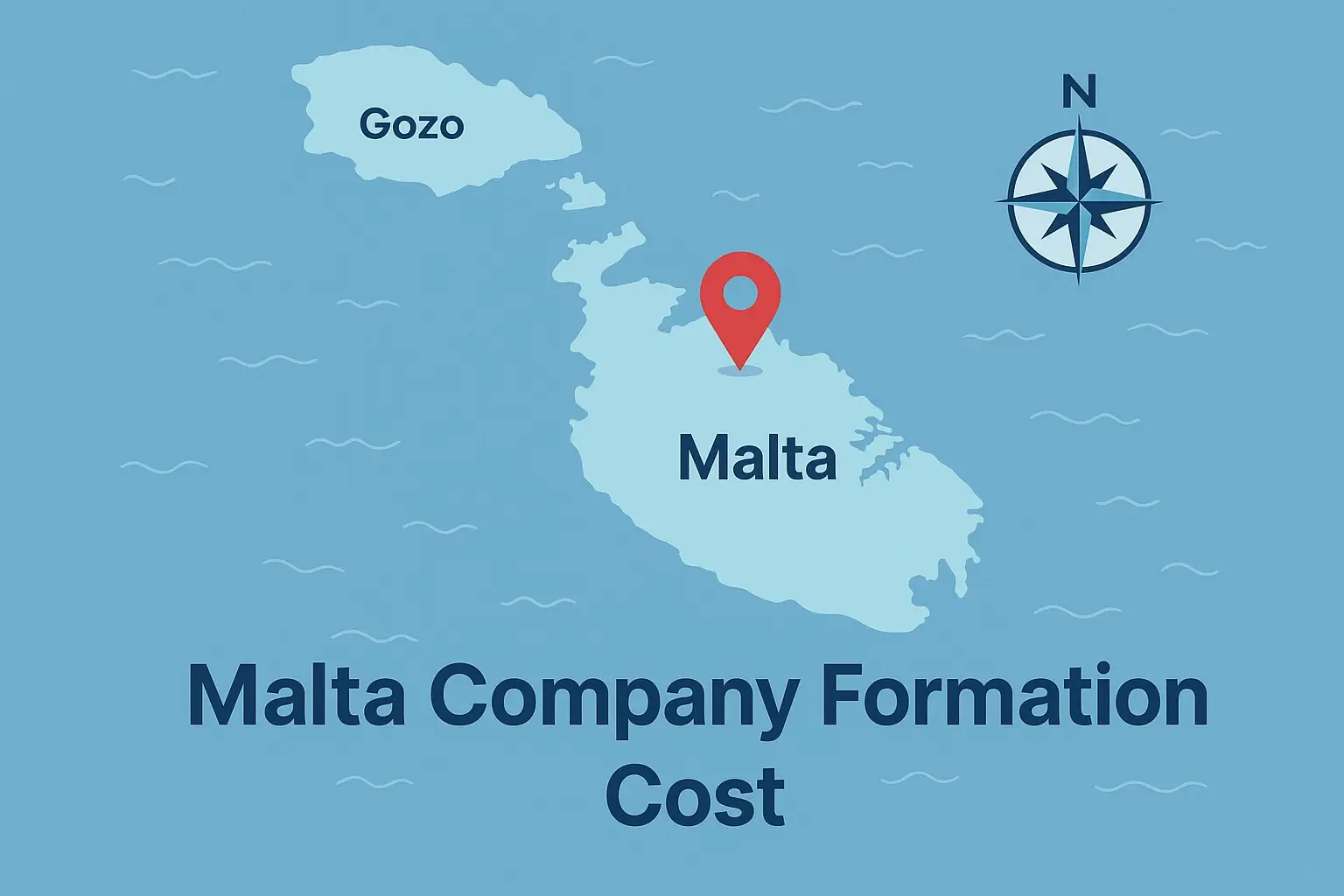Malta offers a combination of transparent legislation, tax incentives, a developed financial infrastructure and the status of a European Union member state — making it an attractive destination for international IT projects, startups and companies operating in the online services sector. In this article, we’ll explore the setup cost, fees, and key requirements for a company formation and startup in Malta.
Registering a Malta LLC is especially advantageous for technology companies with an international structure — SaaS projects, iGaming operators, DevOps outsourcing firms, fintech platforms, and IT holdings. This corporate form combines management flexibility, tax efficiency, and a strong European reputation within a single legal framework.
Malta does not offer an offshore regime but a low-tax system. The formal corporate tax rate is 35%, yet through the imputation tax refund mechanism, the effective rate can be reduced to around 5%. At the same time, companies operate fully within European law and can legally maintain accounts in EU banks.
Advantages of company registration in Malta
1 Reputation and EU recognition
Malta has been a member of the European Union since 2004. Companies registered here can operate across Europe without restrictions, benefit from the single market and sign contracts with European partners without the need for additional document legalisation.
2 Tax system optimised for international companies
While the formal corporate tax rate is 35%, the tax refund system applied when distributing dividends to shareholders reduces the effective rate for most structures to around 5%. This model is fully recognised by the EU and does not raise concerns about “aggressive tax planning”, which is particularly important for IT companies working with banks and investors.
3 Ease of registration and transparent procedures
The company registration process takes an average of 5–10 business days, provided that all required documents are available. The process is managed by the Malta Business Registry (MBR) — a digital registry that enables online submission of documents and coordination with legal and accounting professionals.
4 Developed infrastructure for IT and financial sectors
Malta hosts a wide range of legal, accounting and corporate service providers familiar with international business structures. This allows for quick turnkey company setup — from registration to opening a bank account and obtaining a tax identification number (TIN).
5 Ability to combine different business activities
Maltese legislation does not restrict companies from combining various types of operations — IT development, consulting, licensing, iGaming and other activities can coexist within a single structure, provided the necessary authorisations are obtained.
6 Access to European payment systems Malta Company Formation Cost
Unlike offshore jurisdictions, Maltese companies can open accounts in European banks and fintech platforms such as Revolut Business, Wise and Payoneer. This significantly simplifies settlements with clients and partners.
Main company types and requirements
Choosing the legal form is the first step in registering a company in Malta. Although Maltese law provides several options, most IT companies, startups and international holdings use one main structure — the Private Limited Liability Company (Ltd).
1 Private Limited Liability Company (Ltd)
This is the most common business form in Malta. The company is a separate legal entity, independent from its owners, providing limited liability protection to its shareholders.
Key characteristics:
- minimum share capital — €1,165;
- at least 20% (around €245) must be paid up before registration;
- at least one director and one shareholder (these can be the same person);
- a registered legal address in Malta is required;
- appointment of a company secretary is mandatory.
This structure is suitable for small and medium-sized businesses, IT projects, SaaS platforms, DevOps outsourcing providers, software vendors and consulting companies.
2 Public Limited Company (PLC) Malta Company Formation Cost
Used by large corporations or companies planning a public share offering. The minimum share capital is €46,600, of which 25% must be paid upon registration. This structure is rarely used by tech startups since it involves stricter reporting and corporate governance requirements.
3 Holding company
A holding structure is often established to own shares in other companies, licences, intellectual property or IP assets. Malta offers a favourable tax regime for holding entities: under certain conditions, dividends received from foreign sources are exempt from tax.
This model is especially popular among international IT groups that want to centralise IP ownership, brand management and licensing revenue.
4 Branch office (foreign company branch)
A branch can be registered by a foreign legal entity wishing to operate in Malta without creating a separate company. The branch is not a standalone entity but must maintain accounting records and file reports in line with Maltese regulations.
This model is suitable for companies testing the market or opening a representative office. However, a branch does not enjoy the same tax benefits as a resident Ltd structure.
5 Professional management requirements
- A director can be an individual or a legal entity, resident or non-resident of the EU.
- A company secretary must be appointed — typically a local law firm or an accredited agent.
- The registered office must be located in Malta and can be provided by a legal firm under a service agreement.
6 Accounting and audit obligations
Every Maltese company is required to:
- submit annual financial statements to the Malta Business Registry;
- undergo a mandatory audit (even with low turnover);
- retain accounting records for at least 10 years.
For IT businesses, this ensures a high level of transparency, which enhances credibility with investors and partners.
Cost structure of company formation in Malta: Company Cost

The cost of registering a company in Malta consists of several components — official government fees, share capital, legal and accounting services, and ongoing corporate maintenance expenses. Unlike offshore jurisdictions, the Maltese structure fully complies with EU regulations. While the costs are higher, the level of trust from banks and partners is significantly greater.
1 Registration fees Malta Company Formation Cost
The main government fees are paid upon submission of incorporation documents to the Malta Business Registry (MBR). The amount depends on the company’s share capital and is as follows:
- from €245 for capital up to €1,500;
- up to €2,250 for capital above €500,000.
The registration fee covers document processing, issuance of the company registration number and publication of company details in the official registry.
2 Minimum share capital
For a standard private limited company (Private Ltd), the minimum share capital is €1,165, of which at least 20% (€245) must be paid before registration. The capital can be paid in cash or assets, but in most cases a simple deposit to a lawyer’s or bank account is sufficient.
3 Registration services and legal support
Most companies use the services of licensed corporate providers who prepare incorporation documents, handle registration, and coordinate communication with the MBR and tax authorities.
Typical registration costs:
- preparation of documents and application submission — €1,000–€1,500;
- legal support and consultations — €1,500–€2,500;
- provision of a registered address for one year — €300–€600;
- company secretary services — €400–€800 per year.
If the founders are non-EU residents, providers usually include shareholder identification and KYC verification services, which add approximately €300–€500 to the total cost.
4 Accounting and administrative expenses Malta Company Formation Cost
After registration, the company is required to maintain accounting records, file reports and undergo an audit.
Average annual costs:
- bookkeeping and reporting — €1,000–€2,500;
- financial statement audit — €1,200–€3,000;
- annual filing of returns and reports to the MBR — €100–€200.
Companies with low turnover may opt for simplified service packages, but audits are mandatory even with zero profit.
5 Office and representation expenses
A registered legal address is sufficient for incorporation, typically provided by a corporate service provider. However, if the company employs staff or intends to obtain licences (for example, for iGaming), a physical office in Malta is required.
- virtual office — from €300 per year;
- workspace or small office — €2,000–€5,000 per year.
6 Other expenses
Additional costs to include in the budget:
- opening a corporate bank or fintech account — €500–€1,000;
- obtaining a Tax Identification Number (TIN) and VAT registration — €150–€300;
- services of a nominee director (if required) — €1,000–€2,000 per year.
As a result, the total cost of registering a private limited company (Private Ltd) with a basic service package is approximately €3,000–€5,000, including government fees, legal and administrative expenses. When accounting for bookkeeping and corporate maintenance during the first year, the total expenses reach €6,000–€8,000.
Government fees and administrative charges: Malta Company Formation Cost
Registration and annual payments represent the core mandatory expenses for Maltese companies. All rates are set by the Malta Business Registry (MBR) and depend on the company’s share capital. The entire payment process is fully digital, making the system transparent and predictable.
1 Registration fee
The fee payable upon company incorporation:
- up to €1,500 — €245;
- €1,501 to €5,000 — €320;
- €5,001 to €10,000 — €400;
- €10,001 to €50,000 — €730;
- €50,001 to €100,000 — €1,100;
- €100,001 to €250,000 — €1,500;
- €250,001 to €500,000 — €2,000;
- over €500,000 — €2,250.
This one-time payment covers the issuance of the Certificate of Incorporation and the publication of company details in the registry.
2 Annual return fee
The annual maintenance fee depends on the share capital amount:
- up to €1,500 — €100;
- €1,501 to €5,000 — €140;
- €5,001 to €10,000 — €170;
- €10,001 to €50,000 — €225;
- €50,001 to €100,000 — €400;
- €100,001 to €250,000 — €600;
- €250,001 to €500,000 — €800;
- over €500,000 — €1,400.
The payment must be made within 42 days of the company’s registration date. Late payments incur a penalty of €25 fixed, plus €8 for each additional month of delay.
3 Annual financial statement filing fee
Every company must submit its financial statements within 10 months after the end of the financial year.
- for online filing — €15–€25;
- for paper filing — €25–€40;
- late submission penalties — from €50 to €500, depending on the delay period.
4 Other administrative fees
Additional MBR services and changes that also require payment include:
- changes in directors, shareholders or share capital — €30–€100;
- obtaining certified copies of documents (Certificate of Good Standing, Memorandum, Articles) — €20–€50;
- amendments to the company’s constitutional documents — €120–€250.
Even for small-capital companies, it is advisable to allocate around €300–€500 per year for administrative fees, excluding accounting and legal service costs.
Tax expenses and annual maintenance: Malta Company Formation Cost
Malta offers one of the most competitive tax systems in Europe. While the formal corporate tax rate is relatively high at 35%, the imputation tax refund system effectively reduces the rate for most companies to around 5%. In addition, Malta’s tax legislation fully complies with EU directives, ensuring transparency and stability for international operations.
1 Corporate tax
- Nominal rate — 35% on profits.
- Effective rate — around 5–10%, depending on the refund structure.
The tax refund system allows shareholders to reclaim part of the tax paid when dividends are distributed.
- Under the standard structure, the refund equals 6/7, meaning that out of 35% corporate tax, the company effectively pays only about 5%.
- For certain types of income (e.g., passive investment income), the refund may be 5/7 or 2/3.
Example:
A company earns €100,000 in profit.
- Pays 35% tax = €35,000.
- Upon dividend distribution, shareholders receive a 6/7 refund = €30,000.
- Effective tax burden: €5,000 (5%).
2 Value Added Tax (VAT)
Malta is part of the EU-wide VAT system.
- Standard VAT rate — 18%.
- Reduced rate — 7% (for hospitality and tourism services).
- VAT exemption — applies to exports and certain IT services provided outside the EU.
IT companies working with clients in other EU countries must register in the VIES (VAT Information Exchange System) and report cross-border transactions.
3 Tax on dividends and interest
Malta does not impose withholding tax on dividends paid to non-residents, provided they do not have a permanent establishment in the country. This makes Maltese entities attractive for international holding structures and investors.
- Dividend tax within the EU — 0%.
- Tax on interest and royalties — 0%, provided the recipient is located outside Malta and has no local establishment.
4 Annual maintenance and reporting
Every Maltese company is required to:
- maintain accounting records and keep financial documents for at least 10 years;
- file an annual income tax return within 9 months after the end of the financial year;
- undergo a mandatory annual audit, even if the company has no active operations.
Average annual expenses:
- bookkeeping and financial reporting — €1,000–€2,500;
- audit — €1,200–€3,000;
- tax filing and administrative support — €300–€700.
5 Example of total tax expenses
A company with a net profit of €200,000 will pay:
- corporate tax at 35% = €70,000;
- tax refund of 6/7 = €60,000;
- effective tax = €10,000 (5%).
Adding accounting and audit expenses (around €3,000–€4,000), the total annual tax-related cost will be approximately €13,000–€14,000, which is significantly lower than in most other European countries.
What to know before registering a company in Malta
Registering a company in Malta is not an offshore scheme but a legitimate way to conduct business under EU law. The jurisdiction combines strict transparency requirements with a flexible tax system and favourable conditions for international companies, especially those in IT, finance and digital services.
Key takeaways
1 Low entry barriers.
To establish a private company, a minimum capital of €1,165 is required, and one person can act as both director and shareholder. The registration process usually takes 5–10 business days.
2 Transparent and fixed costs.
Government and annual fees are clearly defined: registration costs around €300–€500, while annual maintenance is €300–€500. Including legal and accounting services, the total first-year cost is approximately €6,000–€8,000.
3 A competitive tax system remains a key advantage.
Despite the nominal 35% corporate tax rate, the effective rate is about 5% after the 6/7 refund. This makes Malta one of the most attractive European jurisdictions for technology companies with an international structure.
4 Full compliance with EU standards.
Malta is not an offshore zone but a regulated EU jurisdiction with mandatory audits, reporting and financial transparency. This ensures trust from banks, investors and clients.
5 Flexibility for IT and digital businesses.
Local legislation allows the combination of different business activities — from SaaS and DevOps to software licensing, gaming and fintech. This enables companies to operate multiple directions under one legal structure.
Registering a company in Malta is the right choice for entrepreneurs who value reputation, stability and flexibility. It suits those building an international IT business focused on European markets and long-term strategic development, rather than those seeking short-term cost savings.








